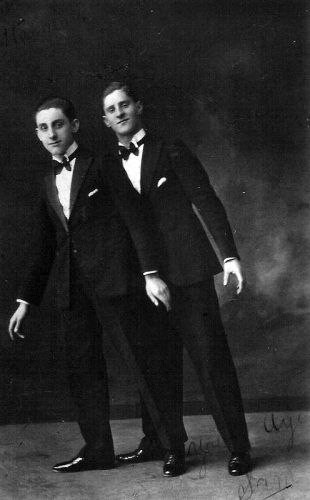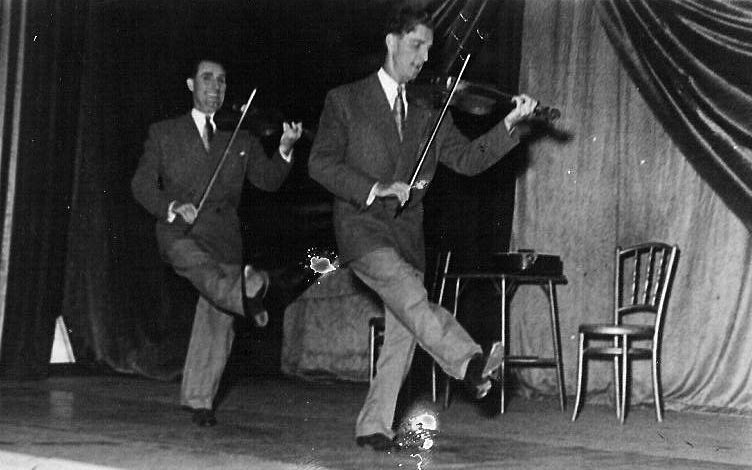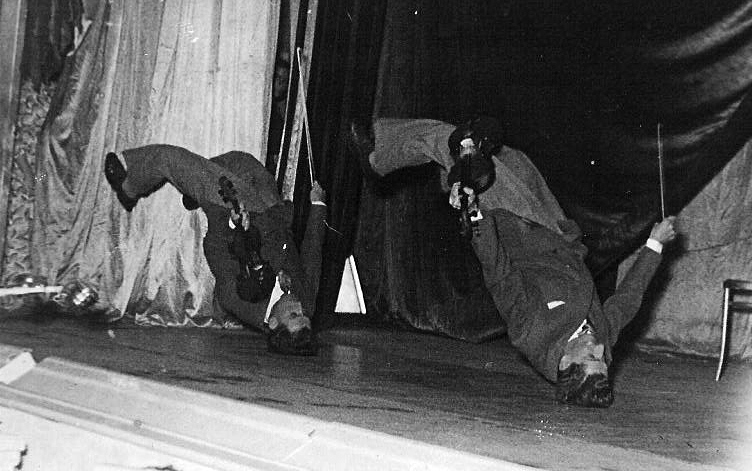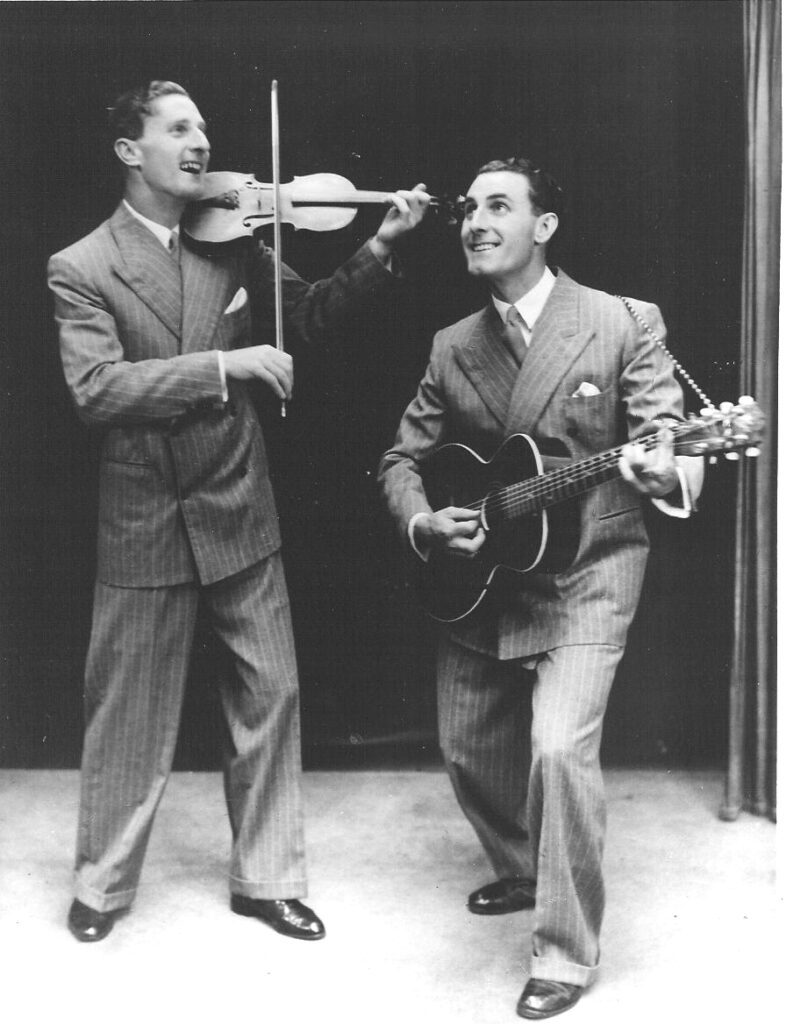Sam and Peter first formed a double act in 1927 shortly after the former left school at the age of 14. They made their first professional appearance at the Tivoli Theatre, Aberdeen, where their three older brothers, Dan, Jim and Harry were appearing in a show called “Contrasts”.
In 1927 Peter and Sam formed a speciality dancing act and were booked to join Nor Kiddie in a revue called ‘This Is It’. Those were the days of touring revues. A revue was a vehicle for the comedy talent of the principal comedian who, with a straight man for a feed, appeared in comedy sketches, and introduced chorus girls and the various speciality acts. Sam and Peter put on an eight minute speciality act, starting with a fairly easy dance in jig time which was then called soft shoe or schottische time. They, however, did it as a tap dance to a tune such as ‘Sunny Side of the Street’. This is in 4/4 but the steps fit more or less the same as a 6/8 tune. After a three or four minute soft shoe routine, which didn’t leave them too breathless, they did a faster type of hornpipe dance such as Sam did in his Exhibition Routine. They also incorporated acrobatic tricks into this. The first performance of “This is It” was at The Grand, Mansfield on 27th February 1928.
Unfortunately in October 1928 Sam was taken ill and never returned to ‘This Is It’.
After Sam had recovered, Peter and he joined the rest of their family in “A Sherry Cocktail” in January 1929, and other performance groupings until World War Two intervened and both were called into the services.


After the war in late1946 Sam and his brother Peter got together and did a double act called ‘Peter and Sam Sherry’ doing more or less the same thing, song and acrobatic dance. As well as performing on their own account they occasionally performed with their brothers Dan and Jim in their revue “Mine’s a Sherry” which ran until 1948.
They started with a song number followed by a light dance routine, more or less the same old style, as the first routine hadn’t to be too strenuous because breath was needed for the rest of the act. They started off with something like ‘Buttons and Bows’ or ‘She Wears Red Feathers and a Hula Hula Skirt’.

Sam had started writing a lot of semi comedy songs during the war and for the second number they used to do a light comedy song, one that Sam written or one which was popular. Sam would play guitar and they would vocalise in harmony and that was the second part of the act. They then did the acrobatic fiddle dance which was then the punch part of the act, finishing as before with a fast acrobatic and winging dance. One way in which this was done was to commence singing “Two of the Fiddlers Three” and then break into the acrobatic routine, finishing the song at the end. But instead of finishing with fast winging, as they were the acrobats of the family, they did acrobatic jumps on their hands across the stage.
They had good summer seasons often working with Will Catlin who owned theatres in Llandudno and Scarborough and put on shows in Great Yarmouth. For some of these summer seasons Dan and Jim Sherry featured on the same bill. Summer shows were in the old revue style with a principal comic who worked throughout the show. As well as doing their speciality act they also filled in for character parts. Sam always seemed to get landed with the policeman’s part. ‘Ello Ello what’s this ‘ere then’. They had to have four different acts because people who came for a fortnight’s holiday wanted to see four different shows. Number one show was on Monday, Tuesday and Wednesday of the first week, number two on Thursday, Friday and Saturday, number three on the first half of the second week and number four on the second half.
In the summer of 1949 they played with Dan and Jim in a show called “Sherry Go Round”. In reality a family revue, this seems only to have lasted for a few months.
‘The Five Sherry Brothers’ had also done pantomime and Sam had played Cat for a number of years, an acrobatic cat in a catskin. Peter and Sam also did Cow and Horse (known as “Horris”) and they had their own horse skin preferring not to depend on the theatre proprietors who often supplied the most tatty old thing.

They often performed in “Little Red Riding Hood”, a pantomime written by Dan Sherry. They earned a reasonable living, not a fortune, but the variety world in general was shrinking all the time and things were getting more and more difficult. It was necessary to have a good long summer season and a good pantomime, filled in with variety dates in between. Working 40 to 45 weeks a year was considered to be doing quite well.
In fact they did much better with pantomime, having fallen in with the Tom Arnold organisation who were the best pantomime people in the country, with theatres like the Palace Manchester, the Empire Liverpool, Theatre Royal Newcastle, Theatre Royal Birmingham, and the Howard and Wyndham theatres which were long run pantomimes. They did well playing robbers or Captain and Mate.
They worked with up and coming people like Max Bygraves. However, one year they were booked as Brokers Men to go to the Theatre Royal at Birmingham, with Max Bygraves and George Bolton as the Dame. Their agent rang them up one day and asked them to play the Ugly Sisters instead. That meant going into drag which was something they’d never done before. They were quite keen on the idea, but unfortunately it turned out to be a disaster. In Cinderella the Ugly Sisters are two of the main comedy parts, but into this pantomime they’d written a Queen which George Bolton as Dame played. So there was very little left for the Ugly Sisters. Had the pantomime been a great success it wouldn’t have mattered but it was not. Tom Arnold’s producer in chief Robert Nesbit came up from London and found fault with everything he could including Sam and Peter and that was the end of their Tom Arnold enterprise. They were not booked the following season.
They played other pantomimes but they were only six weeks instead of the twelve or fourteen weeks and that meant a cut in salary. Then the Summer seasons started to dry up. They did a lot of work with Albert Modley in summer season and with Hilda Baker, but it was getting more of a struggle. Eventually when the summer seasons dried up completely and they were down to about five weeks pantomime it wasn’t even a living. In 1956 Sam’s brother Peter, who had by then re-married, decided to buy a business on the Isle of Wight and retire from show business.